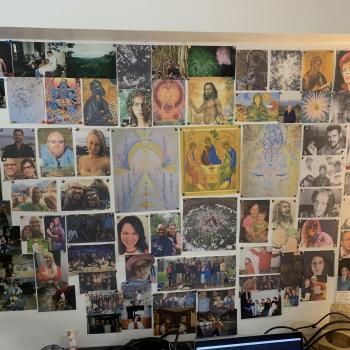I’m at the Missio Alliance conference. Just heard Scot McKnight talk about the distinction between iconic (God-revealing) and idolatrous (us-reflecting) ways of talking about the gospel. He finds a really rich summary in Revelation 1:5 which I may cover later. But I wanted to dash out a quick post on an insight he gave me about what he calls the “soterian gospel,” or salvation as personal afterlife insurance.
McKnight was talking about how every Biblical statement can have an iconic or idolatrous interpretation. He was looking at Revelation 1:5, where it says Jesus is the “faithful witness.” The idolatrous twist on this is to make the gospel about my witness, i.e. the personal conversion story that’s ubiquitous in evangelicalism. An iconic gospel ministry is a kingdom nursery; an idolatrous gospel ministry is a conversion factory.
It’s sometimes hard to spot the versions of the gospel that have been constructed around replicating a commodified personal conversion experience because they say a lot of pious things about God as a sort of smokescreen. Paul had an amazing encounter with the risen Christ on the Damascus Road, but he would be very opposed to turning this encounter into the template for the gospel instead of the cosmic proclamation of his king in whom and for whom all things exist. Any church that has an altar call every week (instead of Eucharist) and sends its members out to convert people on the sidewalk (instead of engaging in patient discipling and catechesis prior to their initiation into the body of Christ) is working with a Damascus Road gospel built off of the believer’s conversion experience instead of the Lordship of Christ.
It just seems suddenly obvious to me that a gospel which calls the believer’s “justification by faith” the whole or even center of the gospel is thoroughly anthropocentric. It doesn’t make it theocentric to talk endlessly about God’s wrath and say that the conversion experience serves the purpose of “glorifying God.” That’s just camouflage. When we do that, we’re addressing an anthropocentric need for the personal experience not to feel too “easy” so that we can have the satisfaction of bashing other personal experience gospels that aren’t as tough as ours is. If the individual conversion is the centerpiece of the gospel, then it’s about personal experience, no matter how we dress it up, and that’s anthropocentric.
If we’re to be a kingdom nursery rather than a conversion factory, then our proclamation must be sharing that the most beautiful man who has ever lived is the king of the world and he is completely the opposite of every corrupt political leader we’ve ever had and the world he creates is the opposite of our life-sucking world that oppresses the privileged and marginalized alike and this king is actually the divine Son and complete revelation of the invisible God. The good news is what we learn about God and the nature of the world through the person of Jesus both in the testimony of the Bible and in our real relationships today with the resurrected Christ whose interactions with humanity didn’t stop when the canon was closed, because if he really is resurrected and reigning right now, then why would he have stopped talking?
Does this involve conversion? Absolutely! He says follow me. Does it involve Jesus paying the price for our sins? Of course! So that we can throw off everything that hinders and the sin that so easily entangles. But the point is to be the symphony of worship that declares the universe’s king. Taking a seat in that orchestra is itself the consummation of all of our vocations and desires as icons of God. So the question we should be asking in our evangelism is not “Have you had your legitimate conversion experience yet because I can help you do that?” but rather “Do you want to come to the greatest party that has ever happened? The guy hosting it is so awesome that I can’t stop talking about him.”











